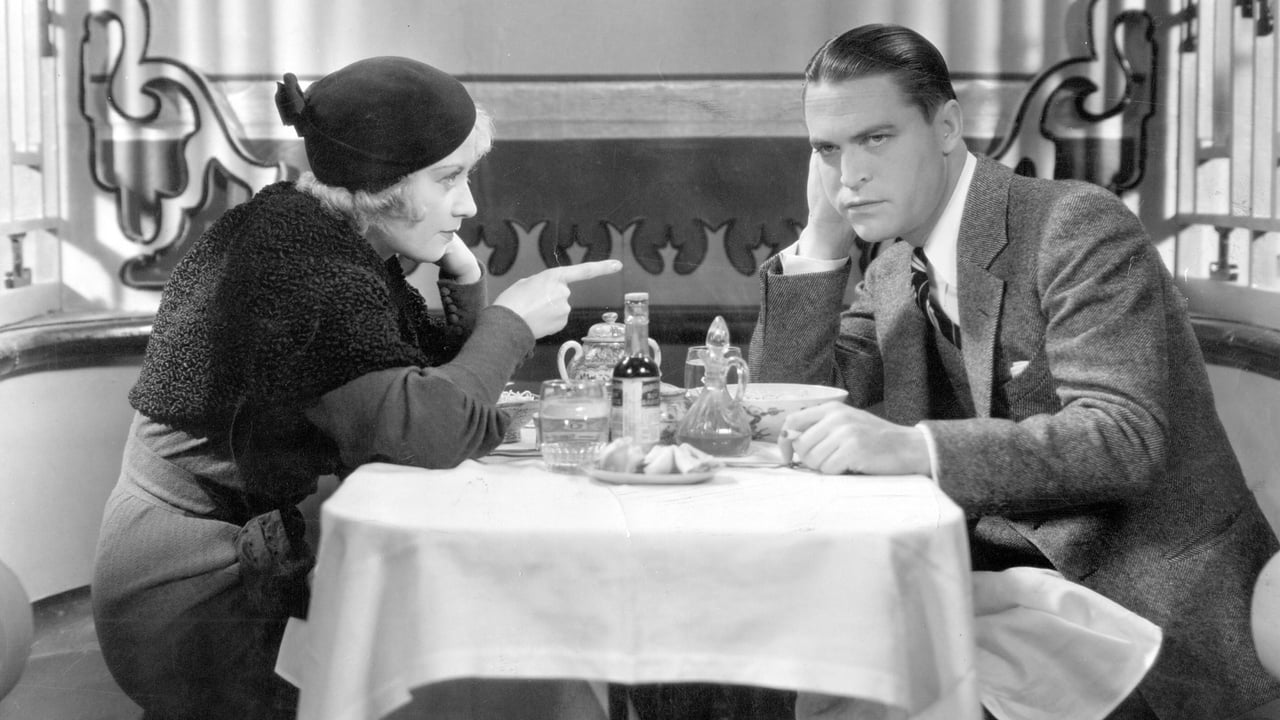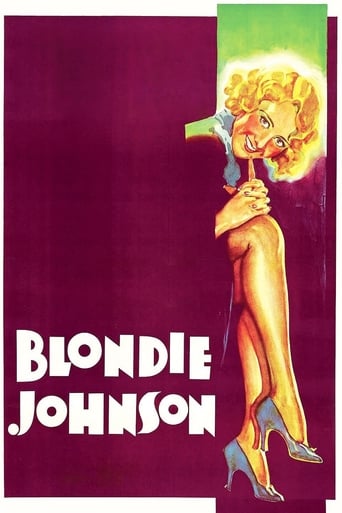



Wow, this is a REALLY bad movie!
This is a must-see and one of the best documentaries - and films - of this year.
View MoreThe film creates a perfect balance between action and depth of basic needs, in the midst of an infertile atmosphere.
View Morewhat a terribly boring film. I'm sorry but this is absolutely not deserving of best picture and will be forgotten quickly. Entertaining and engaging cinema? No. Nothing performances with flat faces and mistaking silence for subtlety.
View MoreJoan Blondell (Blondie Johnson), Chester Morris (Danny), Allen Jenkins (Louis), Earle Foxe (Scannel), Claire Dodd (Gladys), Mae Busch (Mae), Joseph Cawthorn (Lord), Olin Howland (Eddie), Sterling Holloway (Red), Toshia Mori (Lulu), Arthur Vinton (Max Wagner), Donald Kirke (Joe), Tom Kennedy (Hype), Lloyd Ingraham (judge), Maurice Black (Tony), Sam Godfrey (Freddy), Betty Jane Graham (child), Eddie Kane (jewelry assistant), Charles Lane (cashier), Walter Long (Artie), Rolfe Sedan (tailor), Ben Hall (newsboy), Tom Wilson (Swede), Sam McDaniel (porter).Director: RAY ENRIGHT. Uncredited direction: Lucien Hubbard. Original screenplay: Earl Baldwin. Photography: Tony Gaudio. Film editor: George Marks. Art director: Esdras Hartley. Gowns designed by Orry-Kelly. Music director: Leo F. Forbstein. Dialogue director: Stanley Logan. Associate producer: Lucien Hubbard.Copyright 13 February 1933 by First National Pictures, Inc. Released through Warner Brothers Pictures, Inc. New York opening at the Strand: 26 February 1933. 67 minutes. SYNOPSIS: A gangster tries to prevent a female go-getter from muscling in on his rackets.COMMENT: In this typical Warner Brothers exposé of the depression- ridden early 1930s, the script blames the lack of compassion in society at large and the unwillingness of both church and government to do anything about remedying social conditions, for the rise of organized crime. The brief portrait of the mealy-mouthed priest is especially telling. No other Hollywood studio would dare paint a cleric in such an unflattering light. Having set the scene, the rest of the film is fast-paced action, interspersed with a bit of romance, right up to the illogical and somewhat startling cop-out conclusion (which seems to have been added as an afterthought). All the players impress with their realism, but I was particularly struck by Joan Blondell, Allen Jenkins (in a serious role), Joseph Cawthorn (using his real voice and not the "funny" accent), Claire Dodd (gorgeously gowned by Orry-Kelly), Arthur Vinton (the menacing overlord), and Mae Busch. Aside from the unexpectedly light conclusion, director Ray Enright doesn't put a foot wrong. Definitely one of his better films!
View MoreHere is a Pre-Code Gangster Movie with, wait for it, a Female Mob Boss. There is an Interracial Couple (Japanese/White), a Low-Cut Peek at Joan Blondell, and some Bullet Blood. That's about it for the Pre-Code Highlights although there is some Bedroom Banter that would Later become Taboo. A Friend asks "Blondie, why don't you give him a tumble?" for Example.It's got typical Warner Bros. Snappy Patter and Chester Morris' forever present Dangling Cigarette is Stereotypically "charming". The Script Employs a Clever Con on a Jewelry Store, some Hard-Boiled Inner-Gang Violence and Always has Blondie with the Upper Hand.Another Highlight in this Atypical Depression Era Movie is when Blondie gets Frisked by a Cop "Woman", She finds a small caliber pistol Tucked Away very close to a Forbidden Location, that even in a Pre-Coder is Rarely Referenced or given any Attention, and the Scene does not Shy away from the Search as the Dyke like Cop has Her Hands right where they don't Belong.Worth a Watch for its Decisively Differentness and the Always Pleasing to the Eye Joan Blondell, where She, not Only Her Character, more than Holds Her Own with Her Tough Guy Companions.
View MoreCharacter actress/star Joan Blondell makes the most of Blondie Johnson, appearing first as a down-and-outer fired from her previous job because she wouldn't put out for the boss and then developing as an assertive, sassy, gang leader. She's is determined to get ahead in a man's world, and uses her snappy sense of humor, and both her sensitivity and her sensuality to move to the top and earn the respect of her fellow mobsters--simultaneously shooting for romance with (boring) Chester Morris. After the film is over, it really doesn't seem like we've watched a gangster movie, simply because Warner Brothers knew how to be topical by suggestion, and in the period when this film was made, a good deal could be broadly hinted at that was frowned upon in later years: making money the easy way through prostitution, evoking fear in others through protection rackets, and particularly in this film, making a woman boss of the mob. It all looks like great, harmless fun. But after about 1934 and the Production Code, for most actresses it was back to domesticity and the kitchen for almost thirty years!It's a zippy 67 minutes with a familiar Warner's cast, including silent star Mae Busch, the ubiquitous comedy relief Allen Jenkins, and as the "other woman," cynical Claire Dodd. Today there's more than enough menace in a gangster film, another brutal murder just around the corner, another bloodbath waiting; if there's any fun to be had, it's happening elsewhere. But once upon a time one could easily sit through an escapist double feature with this, essentially a gangster romp, as a starter, and perhaps an Edward G. Robinson or Cagney film as the longer main feature. Now you can enjoy this whenever you want a little break!
View MoreWhile most of the movies in this period tried to find some new way of telling the detective story, many worked on the gangster side as well. Today, we don't quite appreciate the cleverness in the variety. I think in part because the things that didn't get embedded in the form just aren't seen even if you watch the movie.Superficially, this is a story of a poor gal who climbs her way to the top of the gang ladder and falls in love along the way in spite of herself. And it has some snappy dialog of the type common in gangster movies of the era. But it has ambitions beyond that, getting darn close to sex as power, sex as beneficial crime. Blondie not only has to fight male kingpins, but she has to best their molls too.All the sex is implied here, odd because of the time: before the code was enforced. But it permeates, even in the earliest scenes where Blondie is impoverished because she refused a screwing by the boss.Ted's Evaluation -- 1 of 3: You can find something better to do with this part of your life.
View More